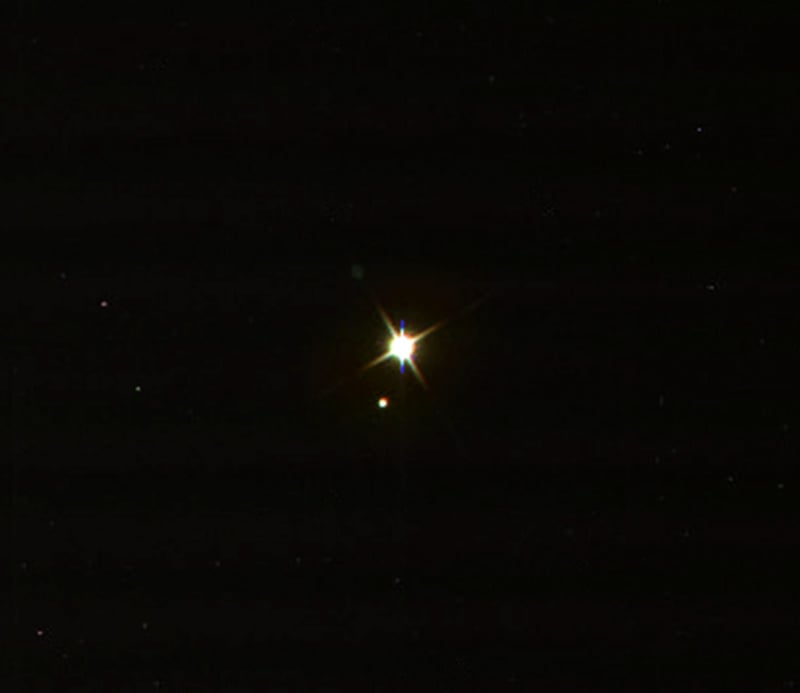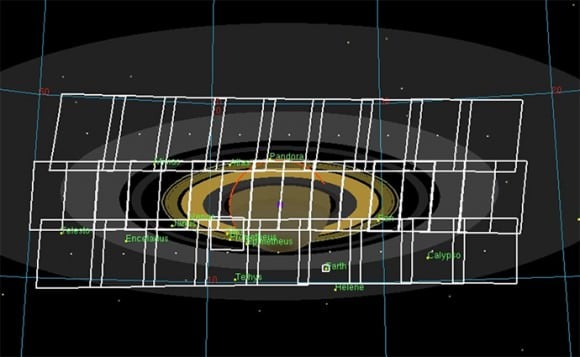Did you
smile
and
wave at Saturn
on Friday? If you did (and even if you didn't) here's how you -- and everyone else on Earth -- looked to the Cassini spacecraft, 898.4 million miles away.
Hope you didn't blink!
The image above is a color-composite made from raw images acquired by
Cassini
in red, green, and blue visible light wavelengths. Some of the specks around the edges are background stars, and others are the result of high-energy particle noise, of which some have been digitally removed.
The Moon is the bright dot just below and to the left of Earth. (An original raw image can be seen
here
.)
See the official NASA images
Cassini acquired the images while capturing views of Saturn in eclipse against the Sun between 22:24:00 UTC on July 19 and 02:43:00 UTC on July 20 (6:24 to 10:43 pm EDT July 19.) On Cassini time, the Earth imaging took place between 22:47:13 UTC (6:47:13 pm EDT) and 23:01:56 UTC (7:01:56 pm EDT) on the 19th.
[caption id="attachment_103613" align="aligncenter" width="580"]
Full mosaic arrangement acquired by Cassini on July 19-20 UTC. Earth was positioned just below the planet. (NASA/JPL-Caltech/SSI)[/caption]
The world was invited to
"Wave at Saturn"
beginning 5:27 pm EDT on Friday -- which allowed enough time for the photons from a waving world to actually reach Cassini's camera just beyond Saturn, 1.44 billion kilometers away. (Did you wave?
I did!
) It was the first time Earth's population was made aware beforehand that their picture would be taken from such a cosmic distance.
[caption id="attachment_103620" align="aligncenter" width="580"]
A crowd gathered on the mall at NASA's Jet Propulsion Laboratory in Pasadena to wave at Saturn on July 19 (NASA/JPL-Caltech)[/caption]
The image of our planet and moon, seen as merely a couple of bright points of light against the blackness of space, recalls Sagan's poignant
"pale blue dot"
passage from
Cosmos
...
[caption id="attachment_103621" align="alignright" width="200"] The "pale blue dot" of Earth captured by Voyager 1 in Feb. 1990 (NASA/JPL)[/caption]
— (1934–1996)
A full mosaic of Cassini's imaging of Saturn silhouetted against the Sun is expected in the coming weeks.
UPDATE:
Here's another RGB color composite, made from raw images acquired with Cassini's wide-angle camera. It shows a view of Saturn and the rings in eclipse as seen from below and behind, backlit by the Sun. Earth is the bright point light near the center. (See original
here
.)
[caption id="attachment_103626" align="aligncenter" width="580"]
Raw image (RGB composite) of Saturn in eclipse with Earth in the distance -- just a pale blue dot. (NASA/JPL-Caltech/SSI. Composite by J. Major.)[/caption]
Images: NASA/JPL-Caltech/Space Science Institute. Composites by Jason Major.
 Universe Today
Universe Today


